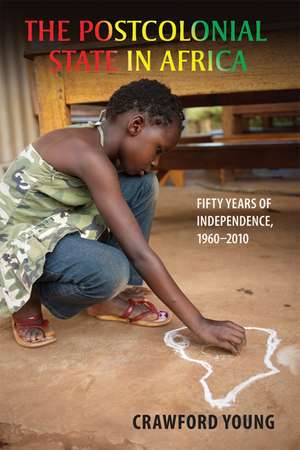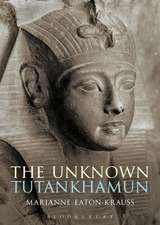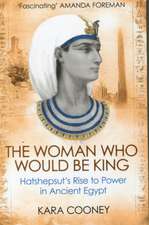The Postcolonial State in Africa: Fifty Years of Independence, 1960–2010
Autor Crawford Youngen Limba Engleză Paperback – 19 noi 2012
In The Postcolonial State in Africa, Crawford Young offers an informed and authoritative comparative overview of fifty years of African independence, drawing on his decades of research and first-hand experience on the African continent.
Young identifies three cycles of hope and disappointment common to many of the African states (including those in North Africa) over the last half-century: initial euphoria at independence in the 1960s followed by disillusionment with a lapse into single-party autocracies and military rule; a period of renewed confidence, radicalization, and ambitious state expansion in the 1970s preceding state crisis and even failure in the disastrous 1980s; and a phase of reborn optimism during the continental wave of democratization beginning around 1990. He explores in depth the many African civil wars—especially those since 1990—and three key tracks of identity: Africanism, territorial nationalism, and ethnicity.
Only more recently, Young argues, have the paths of the fifty-three African states begun to diverge more dramatically, with some leading to liberalization and others to political, social, and economic collapse—outcomes impossible to predict at the outset of independence.
“This book is the best volume to date on the politics of the last 50 years of African independence.”—International Affairs
“The book shares Young’s encyclopedic knowledge of African politics, providing in a single volume a comprehensive rendering of the first 50 years of independence. The book is sprinkled with anecdotes from his vast experience in Africa and that of his many students, and quotations from all of the relevant literature published over the past five decades. Students and scholars of African politics alike will benefit immensely from and enjoy reading The Postcolonial State in Africa.”—Political Science Quarterly
“The study of African politics will continue to be enriched if practitioners pay homage to the erudition and the nobility of spirit that has anchored the engagement of this most esteemed doyen of Africanists with the continent.”—African History Review
“The book’s strongest attribute is the careful way that comparative political theory is woven into historical storytelling throughout the text. . . . Written with great clarity even for all its detail, and its interwoven use of theory makes it a great choice for new students of African studies.”—Australasian Review of African Studies
Young identifies three cycles of hope and disappointment common to many of the African states (including those in North Africa) over the last half-century: initial euphoria at independence in the 1960s followed by disillusionment with a lapse into single-party autocracies and military rule; a period of renewed confidence, radicalization, and ambitious state expansion in the 1970s preceding state crisis and even failure in the disastrous 1980s; and a phase of reborn optimism during the continental wave of democratization beginning around 1990. He explores in depth the many African civil wars—especially those since 1990—and three key tracks of identity: Africanism, territorial nationalism, and ethnicity.
Only more recently, Young argues, have the paths of the fifty-three African states begun to diverge more dramatically, with some leading to liberalization and others to political, social, and economic collapse—outcomes impossible to predict at the outset of independence.
“This book is the best volume to date on the politics of the last 50 years of African independence.”—International Affairs
“The book shares Young’s encyclopedic knowledge of African politics, providing in a single volume a comprehensive rendering of the first 50 years of independence. The book is sprinkled with anecdotes from his vast experience in Africa and that of his many students, and quotations from all of the relevant literature published over the past five decades. Students and scholars of African politics alike will benefit immensely from and enjoy reading The Postcolonial State in Africa.”—Political Science Quarterly
“The study of African politics will continue to be enriched if practitioners pay homage to the erudition and the nobility of spirit that has anchored the engagement of this most esteemed doyen of Africanists with the continent.”—African History Review
“The book’s strongest attribute is the careful way that comparative political theory is woven into historical storytelling throughout the text. . . . Written with great clarity even for all its detail, and its interwoven use of theory makes it a great choice for new students of African studies.”—Australasian Review of African Studies
Preț: 205.22 lei
Nou
Puncte Express: 308
Preț estimativ în valută:
39.27€ • 40.85$ • 32.42£
39.27€ • 40.85$ • 32.42£
Carte disponibilă
Livrare economică 24 martie-07 aprilie
Preluare comenzi: 021 569.72.76
Specificații
ISBN-13: 9780299291440
ISBN-10: 0299291448
Pagini: 488
Ilustrații: 1 map, 12 tables
Dimensiuni: 152 x 229 x 41 mm
Greutate: 0.68 kg
Ediția:1
Editura: University of Wisconsin Press
Colecția University of Wisconsin Press
ISBN-10: 0299291448
Pagini: 488
Ilustrații: 1 map, 12 tables
Dimensiuni: 152 x 229 x 41 mm
Greutate: 0.68 kg
Ediția:1
Editura: University of Wisconsin Press
Colecția University of Wisconsin Press
Recenzii
“A highly readable, sweeping, and yet detailed analysis of the African state in all its failures and moments of hope. Crawford Young manages to touch upon all the important issues in the discipline and crucial developments in the recent history of the African continent. This book will be a classic.”—Pierre Englebert, author of Africa: Unity, Sovereignty and Sorrow
“An interesting, thoughtful, and comprehensive work rich in case material and analysis; the incorporation of the analysis of the North African states is particularly noteworthy. The scope of Young’s knowledge and mastery of the scholarly literature is truly impressive.”—Catherine Boone, author of Political Topographies of the African State: Territorial Authority and Institutional Choice
“An extraordinary tour de force that cogently captures the dynamic political trajectory of the African state during the continent’s first half century of independence.”—Michael Schatzberg, series editor
“The new book is a masterful synthesis of the tumultuous trajectories of Africa’s independent states in the five decades following decolonization.”—Journal of Modern African Studies
“Well written, analytically coherent, and thoughtfully presented, Young’s volume relies on extensive academic literature but also provides original analyses and insights. It will serve the needs of students, professional Africanists, and the much larger reading public who want a one-stop authoritative account of Africa’s changing political landscape. Highly recommended.”—Choice
“With remarkable command of the evidence and a keen grasp of theoretical nuance, Young shows how colonialism and the patterns of modernization it wrought dramatically altered cultural identities and created cleavages between groups, which still shape domestic conflict throughout the region, sometimes with devastating consequences.”—Foreign Affairs
“The uniqueness of the book is that it does not place blame on any side for the demise of Africa’s political economy . . . I highly recommend that researchers, students, teachers of African studies, and general readers obtain copies of the book, as they will regret not doing so.”—Africa Today
“ A work of scope and ambition, written with great clarity and flair. Each chapter is densely packed with historical detail and theoretical insight, as Young synthesizes multiple strands of scholarship into an easily digestible narrative.”—H-Net Reviews
Notă biografică
Crawford Young is the Rupert Emerson Professor of Political Science at the University of Wisconsin–Madison. His many books include The Rise and Decline of the Zairian State, Ideology and Development in Africa, The Politics of Cultural Pluralism, and The African Colonial State in Comparative Perspective.
Cuprins
List of Tables
Preface
Glossary and Acronyms
Part I Setting the Frame
1 A Half-Century of African Independence: Three Cycles of Hope and Disappointment
2 In Search of the African State
Part II Itineraries: The Three Cycles of Hope and Disappointment
3 Decolonization, the Independence Settlement, and Colonial Legacy
4 The Road to Autocracy: Breakdown of the Decolonization Settlements
5. Anatomy of State Crisis
6 Democratization and Its Limits
Part III Themes and Conclusions
7 Morphology of Violent Civil Conflict
8 Africanism, Nationalism and Ethnicity: Th Ambiguous Triple Helix of Identity
9 The African Post-colonial State: Concluding Observations
Notes
Index
Descriere
In The Postcolonial State in Africa, Crawford Young offers an informed and authoritative comparative overview of fifty years of African independence, drawing on his decades of research and first-hand experience on the African continent.
Young identifies three cycles of hope and disappointment common to many of the African states (including those in North Africa) over the last half-century: initial euphoria at independence in the 1960s followed by disillusionment with a lapse into single-party autocracies and military rule; a period of renewed confidence, radicalization, and ambitious state expansion in the 1970s preceding state crisis and even failure in the disastrous 1980s; and a phase of reborn optimism during the continental wave of democratization beginning around 1990. He explores in depth the many African civil wars—especially those since 1990—and three key tracks of identity: Africanism, territorial nationalism, and ethnicity.
Only more recently, Young argues, have the paths of the fifty-three African states begun to diverge more dramatically, with some leading to liberalization and others to political, social, and economic collapse—outcomes impossible to predict at the outset of independence.
Young identifies three cycles of hope and disappointment common to many of the African states (including those in North Africa) over the last half-century: initial euphoria at independence in the 1960s followed by disillusionment with a lapse into single-party autocracies and military rule; a period of renewed confidence, radicalization, and ambitious state expansion in the 1970s preceding state crisis and even failure in the disastrous 1980s; and a phase of reborn optimism during the continental wave of democratization beginning around 1990. He explores in depth the many African civil wars—especially those since 1990—and three key tracks of identity: Africanism, territorial nationalism, and ethnicity.
Only more recently, Young argues, have the paths of the fifty-three African states begun to diverge more dramatically, with some leading to liberalization and others to political, social, and economic collapse—outcomes impossible to predict at the outset of independence.









